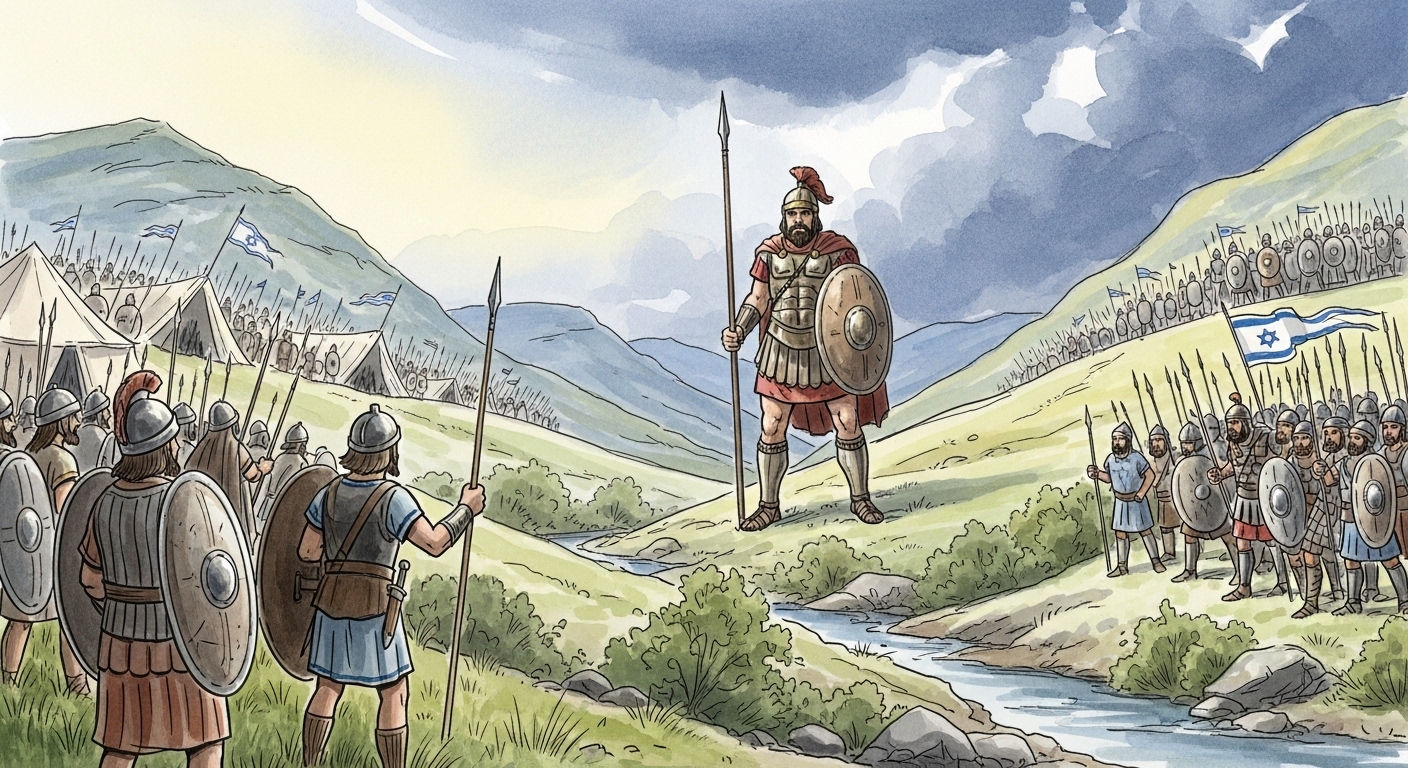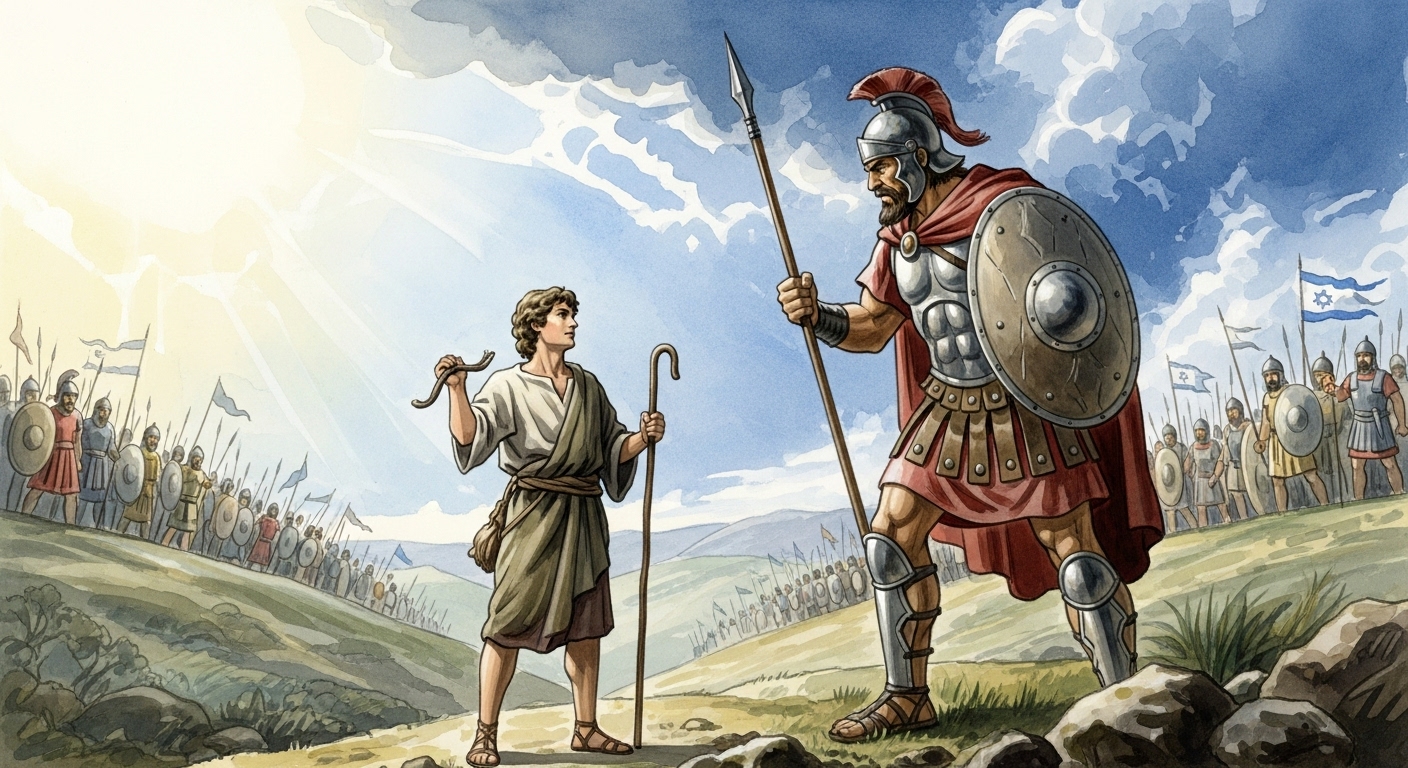Courage Like David: Facing Giants With Faith
You already know the basic story: a young shepherd named David faces a giant named Goliath and, against all odds, defeats him. But when you dig into the story, you find more than a dramatic battlefield moment — you find a pattern for how to face your own giants with faith. This article explores lessons from David and Goliath that help you develop courage grounded in trust, clarity of calling, practical preparation, and bold action. Throughout, you’ll see Bible references pointing you to the original text for context and truth.
Why this story still matters
The story of David and Goliath feels timeless because it speaks to the human condition: you will face obstacles that look impossible. You might think giants are only physical enemies, but they can also be fear, anxiety, financial pressures, illness, toxic relationships, or systems that seem immovable. The lessons from David and Goliath show you how to meet those challenges with a faith that is both humble and courageous.
The situation on the battlefield
When the Israelites faced the Philistines, the armies were in a stalemate because of Goliath’s taunt. The giant stood and challenged Israel daily, and the national mood was one of fear and demoralization. You can read that scene and the specifics of the challenge in the Bible: 1 Samuel 17:1–11.

Seeing the environment helps you understand the scale of what David confronted.
Who David was before the battle
Before David became a warrior, he was a shepherd and the youngest son in his family. He had been anointed earlier as the future king, but he had not yet assumed that role publicly. His formative years shaped his faith and character. The moment of his anointing is recorded here: 1 Samuel 16:7. Understanding David’s background helps you see how everyday life and quiet faith form the foundation for courageous acts later.
Goliath: a real and present threat
Goliath wasn’t just a symbolic challenge; he was a heavily armored warrior who terrorized the Israelite camp. The description of the giant and the situation he created for the Israelites shows you the intensity of what David chose to face: 1 Samuel 17:4–11. When you face giants, they may also come with loud voices, impressive armor, and a track record of defeating others — and it’s important to acknowledge that reality.
What courage really is
Courage isn’t the absence of fear; it’s acting despite fear. David was not fearless — but he refused to let fear dictate his response. When David spoke to King Saul, he explained that he had faced lions and bears defending his sheep, so he trusted God to help him now: 1 Samuel 17:32–37. Courage like David’s starts with a history of relying on God in smaller battles, which prepares you for the bigger ones.
Faith versus bravado
You’ll notice a clear difference between David’s faith and the bravado you see in Goliath. Goliath relied on physical strength and intimidation; David relied on God and righteous purpose. David declared, “You come against me with sword and spear and javelin, but I come against you in the name of the Lord Almighty” (1 Samuel 17:45).

The distinction matters when you consider how to act: are you relying on your own ability to overpower the situation, or are you depending on a higher power and a right cause?
Identity and calling shape courage
David knew who he was and whose he was. He was a shepherd, a servant, and a man who had been anointed by God. That identity gave him clarity about his calling to protect and serve. When you know your identity and calling, it changes how you approach challenges. You’re less likely to be paralyzed by fear and more likely to move with purpose.
Preparation matters — even if it looks small
You may find it striking that David didn’t take Saul’s armor. He chose his sling and five smooth stones because that’s what he knew how to use. His preparation included practical skills and honest self-awareness about his strengths. The passage where David selects his stones and approaches Goliath is here: 1 Samuel 17:40. Lessons from David and Goliath show that preparation often looks like consistent, ordinary practice — the small disciplines that build skill and confidence for decisive moments.
Experience shapes faith
David’s confidence came from lived experience, not wishful thinking. He recounted how he had killed a lion and a bear that threatened his flock, and that experience formed his trust in God for the present challenge (1 Samuel 17:34–36). For you, this means cultivating a track record of obedience and trust — the small victories in daily life that teach you to rely on God when giants appear.
Choosing your weapons
David’s choice of weapon — a sling and a stone — reminds you that God often uses what you already have. The tools you consider insignificant can become the means of victory when used with faith and skill. After David struck Goliath, the result was decisive: the stone struck the giant on the forehead and he fell, allowing Israel to secure victory (1 Samuel 17:49–50). The lesson is practical: identify your usable, familiar resources and develop the competence to apply them well.
The power of perspective
David reframed the battle from an impossible confrontation into a moment to demonstrate God’s power. Rather than seeing an unbeatable foe, he saw an opportunity for God to act. That perspective shift is one of the sustained lessons from David and Goliath: when you change how you view the problem, your options for action widen. Faith gives you a different lens through which to evaluate risk and opportunity.
Standing when others shrink back
One striking detail is how the Israelite soldiers reacted: fearful and paralyzed. David stood up when others retreated. Courage often looks like standing in a place where others are unwilling to go — not for pride, but because you believe it’s the right thing to do. When you step forward in faith, you might inspire others to find their courage as well.
The danger of underestimating the opponent and oneself
Two temptations lurk in these narratives: underestimating the opponent and underestimating yourself. Goliath underestimated David’s resolve and the power behind him; conversely, Saul underestimated David’s capabilities until he heard his report. Lessons from David and Goliath teach you to avoid both errors: respect the reality of the challenge without allowing it to define the outcome, and assess your abilities honestly so you can use them effectively.
Community, leadership, and responsibility
Although David acted individually in combat, his action had corporate consequences. His victory changed the course for Israel. Leadership sometimes calls for one person to act boldly for the good of the many. You should consider how your courage could benefit others — sometimes the act of facing a giant is less about personal glory and more about service to your community.
Handling criticism and doubt
David faced skepticism and criticism from King Saul and others; yet he didn’t allow it to derail him. If you’re preparing to take a leap of faith, expect critics. The response modeled by David is to remain focused on the mission and the source of your strength rather than on the voices that doubt you. Your conviction will often be stronger when grounded in experience, prayer, and clear motives.
When God’s glory is the goal
David framed the conflict as an opportunity to show God’s power rather than to exalt himself. His declaration about fighting “in the name of the Lord” makes the intention clear: to vindicate God’s name among the nations (1 Samuel 17:45).

This shifts your motivation. When you aim to honor God or serve others, courage becomes more than personal bravery — it becomes an act of stewardship.
Practical steps for facing your giants
You may be wondering how to translate these biblical insights into everyday action. Here are practical steps inspired by lessons from David and Goliath that you can take:
- Take inventory of your skills and resources, like David’s sling and stones, and practice them consistently.
- Recount your past experiences of God’s faithfulness to build confidence for future challenges.
- Seek clarity on your identity and calling so your actions align with purpose.
- Reframe problems as opportunities for growth and testimony, not merely threats.
- Prepare practically while praying earnestly.
These steps are straightforward, but they’re powerful when combined with a posture of faith.
Prayer, preparedness, and action
One trap is to either pray without action or to act without prayer. David’s story models both a posture of trust and decisive action. You must cultivate a prayer life that clarifies your motives and aligns your will with God’s, while also preparing practically and stepping forward when the moment comes. Prayer informs strategy; strategy channels your faith into focused action.
Training in the margins
Your most significant preparation often happens outside the spotlight. David’s training as a shepherd — protecting sheep from predators — wasn’t glamorous, but it shaped his courage. Similarly, your everyday disciplines (work, study, relationships, prayer) prepare you for crucial moments. The ordinary practice of integrity and skill compounds into readiness.
When giants are internal
Some giants live inside you: fear, insecurity, jealousy, depression. Lessons from David and Goliath apply inwardly as well. You can confront internal giants by naming them, seeking help, practicing spiritual disciplines, and taking deliberate small steps toward health. Remember that the fight may not always be dramatic; often, it’s a steady process of aligning your thoughts and actions with truth.
When giants are structural
Some giants are systems or cultural forces that hurt people in broad ways. David’s single act had a systemic effect because it changed the dynamic of the battlefield. Similarly, your courageous actions — especially when aligned with justice and compassion — can disrupt harmful systems. That often requires persistence, coalition-building, and a long view, even as individual acts matter.
The role of humility
David wasn’t boastful; he was humble and reliant on God. Humility frees you to serve others and to keep perspective about success and failure. When you act from humility, you protect yourself from pride and open the door to growth and correction.
Handling victory and success
Victory can be disorienting. After David’s victory, the Israelites pursued the Philistines and secured a broader victory. The way you handle success matters: it should lead to gratitude, stewardship, and continued dependence on God. A triumph should not turn into self-reliance but into renewed humility and mission.
Lessons when victory doesn’t come quickly
Not every giant falls as swiftly as Goliath. Sometimes you’ll experience prolonged struggles, seasons of waiting, or partial wins. Lessons from David and Goliath remain relevant: continue to trust, adjust your strategy when needed, learn from experience, and seek community support. Faith often matures most in seasons of waiting and perseverance.
Faith is both trust and action
One persistent lesson from David and Goliath is that faith combines trust in God and decisive human action. David didn’t wait for God to strike Goliath without him; he ran to the fight, selected his stone, and used his skill. Likewise, your faith should move you to act responsibly, courageously, and with integrity.
Avoiding the “magic formula” mistake
Sometimes people reduce the story to a formula: pick up a stone, expect immediate miracles, and you’ll be victorious. But the story is richer and includes training, identity, community, and God’s sovereign power. Don’t oversimplify the process; embrace the multifaceted nature of spiritual courage and the persistence required to face real challenges.
The ripple effect of your courage
When you step into courage, others notice. David’s example emboldened the Israelites. Your courage can have downstream effects in families, workplaces, churches, and communities. A single act of faithfulness can inspire others to confront their own giants.
Developing a daily discipline of courage
You can cultivate courage daily by practicing small acts of obedience, speaking truth with love, serving when it’s inconvenient, and taking manageable risks in faith. Over time, those small acts form a habit of courage that prepares you for larger battles.
The importance of mentors and leaders
Though David acted alone in the immediate moment, leaders like Samuel and King Saul were part of the larger story. Seek mentors, ask for counsel, and build relationships with people who can help you grow. Wise guidance can sharpen your discernment and keep your motives clear.
Stories of modern giants
Consider real-life giants like serious illness, addiction, systemic injustice, or crippling debt. The lessons from David and Goliath apply: name the problem, assess your resources, recall past help, prepare practically, and move in faith. You don’t have to have every step mapped out; often, your first faithful step is enough to begin a new trajectory.

How to pray when facing giants
Prayer can take many forms: lament, petition, thanksgiving, and intercession. When you pray about a giant, be honest about your fear, ask for wisdom, and request the courage to act. Combine prayer with concrete steps — call someone for help, make a plan, or begin a treatment. Prayer fuels action and keeps your heart anchored.
When you need help from others
Some giants are too big to face alone. Ask for help. Bring the problem to trusted friends, counselors, or professionals. David had allies in his life at different times; your community can be a source of strength and accountability. Courage includes the humility to accept help when necessary.
Learning from setbacks
Not every attempt to face a giant will succeed the first time. If you experience setbacks, learn from them and try again with a refined strategy, and depend on God for wisdom. Resilience is an essential part of spiritual courage.
The spiritual dimension of the fight
The story of David and Goliath also points to a spiritual battle. Scripture speaks of wrestling not only with flesh and blood but with spiritual realities. For a broader theological frame, you may reflect on passages that address faith and spiritual warfare. The New Testament encourages you to stand firm in faith; a helpful passage about faith as trust is Hebrews 11:1: Hebrews 11:1. That verse complements lessons from David and Goliath by defining faith and its role in courageous acts.
The confidence that comes from God, not self
David’s confidence was ultimately rooted in God’s reputation and power, not his own prowess. When you adopt that posture, your courage is sustainable. Scripture invites you to find strength in God, as seen in verses like Philippians 4:13.

That confidence keeps you humble and resilient in the face of change.
Practice makes possible
If you want courage like David’s, practice faithful responses to small challenges daily. Face small fears intentionally, serve in situations that stretch you, and keep a record of how God helps you. Those experiences compound into a reservoir of trust you can draw from when a giant appears.
The long story beyond the battle
David’s life after Goliath wasn’t free from struggle; he faced many challenges as a leader. This reminds you that a single victory doesn’t mean the end of difficulty. The pattern is repeated: keep returning to the disciplines of prayer, community, integrity, and strategic action. Life involves a series of battles, and sustained growth comes from continual dependence and learning.
Applying these lessons in your context
You don’t need to be on a literal battlefield to apply lessons from David and Goliath. Whether you’re facing relational conflict, career uncertainty, personal addiction, or social injustice, the elements are similar: identify the giant, take stock of resources, remember past successes and God’s faithfulness, prepare practically, and move with faith. Repeat the cycle as you grow.
Moving forward with courage
Start with one concrete step. Pick a small, manageable action today that moves you toward confronting a current giant. It could be making a phone call, scheduling an appointment, talking to a trusted friend, or starting a financial plan. Small steps matter and are consistent with the spirit of lessons from David and Goliath.
Final encouragement
Courage like David’s is available to you when you root your bravery in faith, prepare through daily disciplines, and act with humility and conviction. Giants will come in many forms, but the pattern remains: trust in God’s character, use the tools you have, learn from experience, and step forward in faith. The story of David and Goliath invites you to see each giant as an opportunity for courage and testimony.
Explore More
For further reading and encouragement, check out these posts:
👉 7 Bible Verses About Faith in Hard Times
👉 Job’s Faith: What We Can Learn From His Trials
👉 How To Trust God When Everything Falls Apart
👉 Why God Allows Suffering – A Biblical Perspective
👉 Faith Over Fear: How To Stand Strong In Uncertain Seasons
👉 How To Encourage Someone Struggling With Their Faith
👉 5 Prayers for Strength When You’re Feeling Weak

📘 Jesus and the Woman Caught in Adultery – Grace and Mercy Over Judgement
A powerful retelling of John 8:1-11. This book brings to life the depth of forgiveness, mercy, and God’s unwavering love.
👉 Check it now on Amazon 🛒💥
🔥 “Every great message deserves a home online.” 🌍💬🏡
Don’t let your calling stay hidden. Start a Christian blog or website using Hostinger — with 99.9% uptime, a free domain, and SSL, your voice can shine for God’s glory anytime, anywhere.
💥 Begin today. 🛒 Try it RISK-FREE! ✅
✝️ “Your body is God’s temple — care for it with purpose.” 💪💖🏛️
Renew your energy and restore balance naturally. Mitolyn helps support a healthy metabolism, giving you the vitality to live out God’s calling with strength and confidence.
🔥 Unlock Your Metabolic Power! ⚡Burn More Calories & Feel Great With Mitolyn. 💪
👉 Start Today. 🚀 Check Price Now. 🛒💰
💰 As a ClickBank & Amazon Affiliate, I earn from qualifying purchases.
📖 Acknowledgment: All Bible verses referenced in this article were accessed via Bible Gateway (or Bible Hub).
🚀 Want to explore more? 👉 Dive into our new post on Why Jesus? and experience the 🔥 life-changing truth of the Gospel!




